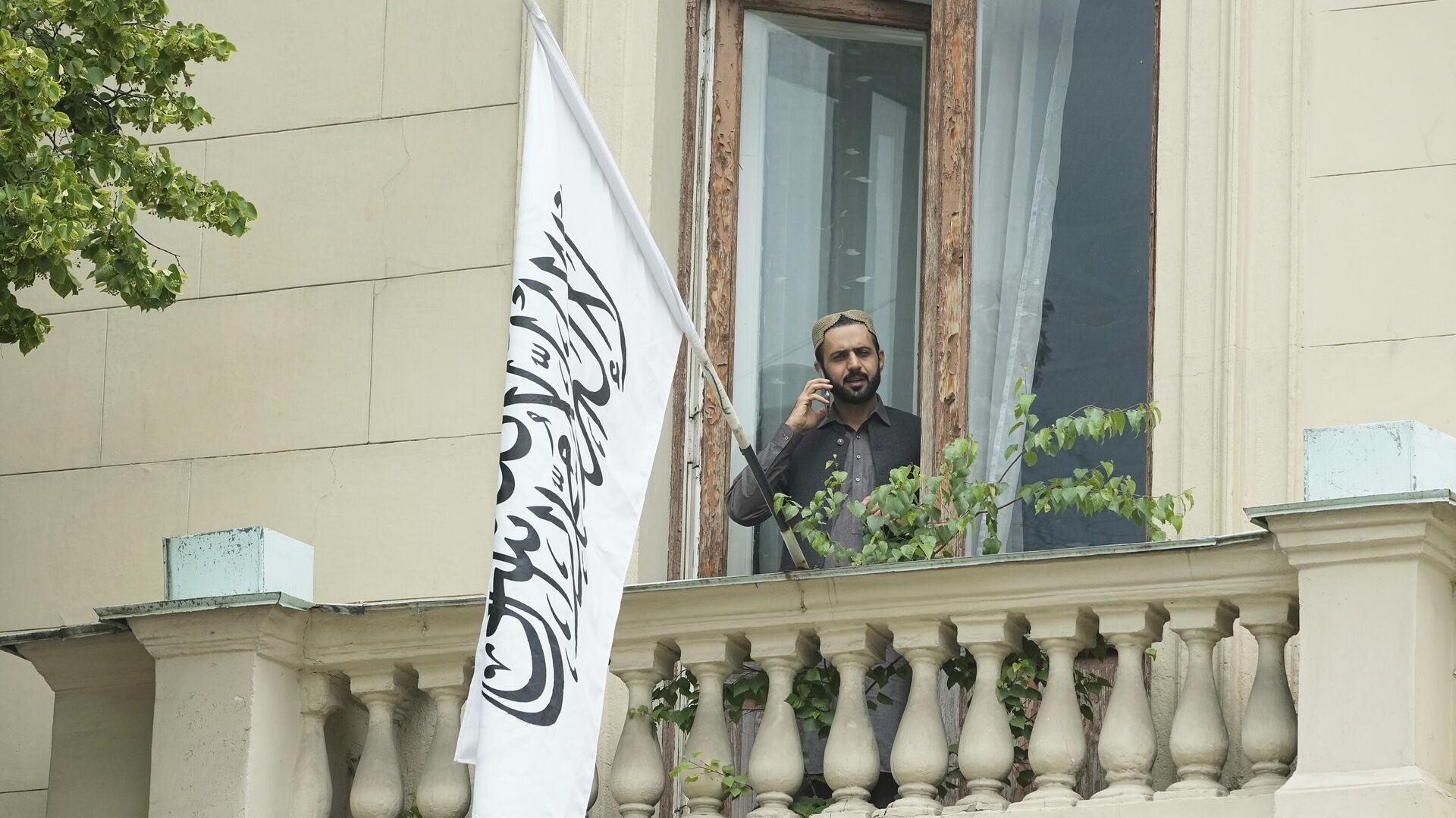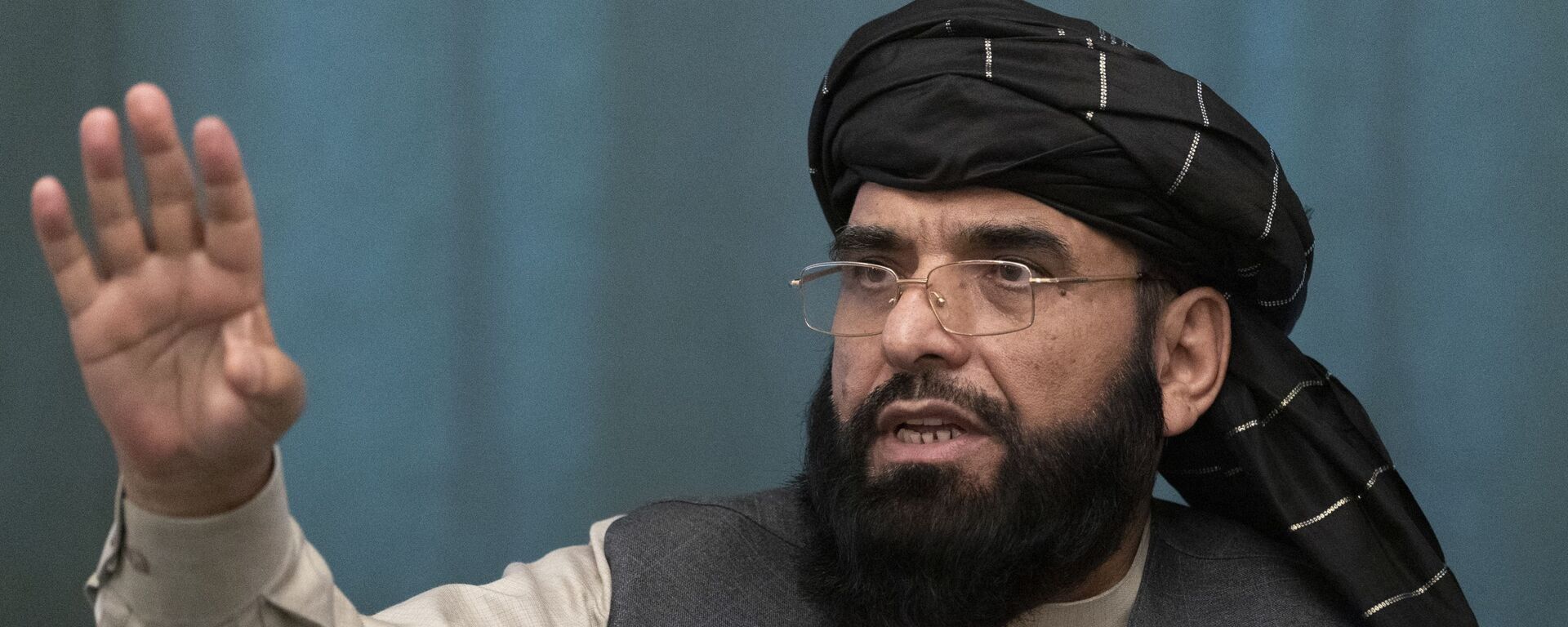https://sputniknews.in/20250704/russia-first-to-recognise-taliban-govt-implications-for-india--beyond-9401075.html
Russia First to Recognise Taliban State: Implications for India and Beyond
Russia First to Recognise Taliban State: Implications for India and Beyond
Sputnik India
During its first rule from 1996 to 2001, the Taliban gained recognition from just three nations: Saudi Arabia, the United Arab Emirates (UAE) and Pakistan. 04.07.2025, Sputnik India
2025-07-04T20:24+0530
2025-07-04T20:24+0530
2025-07-07T13:15+0530
sputnik opinion
rajnath singh
russia
afghanistan
india
taliban
international energy agency (iea)
moscow
kabul
delhi
https://cdn1.img.sputniknews.in/img/07e9/07/04/9402818_0:161:3071:1888_1920x0_80_0_0_6deae9f09e8b7532b8d60b770e187714.jpg
Russia is the first nation to officially recognise the Taliban state in Afghanistan since its capture of Kabul in 2021.Thursday's announcement by the Russian Foreign Ministry marks many firsts for the Taliban's second period in power in the war-ravaged nation.Other than Russia, no country has acknowledged the Islamic Emirate of Afghanistan (IEA) and its flag or removed the Taliban from its list of banned organisations.Afghan Foreign Minister Amir Khan Muttaqi hailed the move as a "brave decision."But experts have different views.Dr Priyanka Singh, an associate fellow at the New Delhi-based think tank Manohar Parrikar Institute for Defence Studies and Analyses (MP-IDSA), argued that Russia took the step to provoke Western nations amid the conflict in Ukraine.The West has continued to ostracise the Taliban while China and a few others have fully engaged them, she explained.Shivam Shekhawat, a Junior Fellow at India's premier foreign policy organisation, Observer Research Foundation, believes that India and Russia share common concerns in the country.Over the last four years, India has also increased its engagement with the Islamic Emirate of Afghanistan (IEA) to secure its interests.The recent phone call between Indian External Affairs Minister S. Jaishankar and the interim IEA foreign minister in the aftermath of Operation Sindoor was the biggest manifestation of this growing engagement, she stressed.With Russian recognition, breakthroughs could be expected on widening the connectivity web for Afghanistan in projects where Moscow is involved.With both India and Russia choosing to engage the Taliban, further options for Afghanistan via the Chennai-Vladivostok maritime corridor could be explored to see if they materialise to benefit Afghanistan and its people, the commentator argued.For both India and Afghanistan, Chabahar is seen as a means of reducing the importance of Pakistan in gaining access to Afghanistan and other countries in Central Asia.Even during the most recent conflict between India and Pakistan, the closure of the Attari-Wagah crossing posed difficulties for Afghan traders, even as India allowed some trucks to pass as a goodwill gesture, Shekhawat suggested.
https://sputniknews.in/20250425/culprits-need-to-be-brought-to-justice-taliban-backs-india-slams-pahalgam-attack-9024899.html
russia
afghanistan
india
moscow
kabul
delhi
new delhi
chabahar port
central asia
Sputnik India
feedback.hindi@sputniknews.com
+74956456601
MIA „Rossiya Segodnya“
2025
Pawan Atri
https://cdn1.img.sputniknews.in/img/07e6/0c/13/139630_147:0:831:684_100x100_80_0_0_8fa2b25903e7787fe6a2698552c167df.png
Pawan Atri
https://cdn1.img.sputniknews.in/img/07e6/0c/13/139630_147:0:831:684_100x100_80_0_0_8fa2b25903e7787fe6a2698552c167df.png
News
en_IN
Sputnik India
feedback.hindi@sputniknews.com
+74956456601
MIA „Rossiya Segodnya“
Sputnik India
feedback.hindi@sputniknews.com
+74956456601
MIA „Rossiya Segodnya“
Pawan Atri
https://cdn1.img.sputniknews.in/img/07e6/0c/13/139630_147:0:831:684_100x100_80_0_0_8fa2b25903e7787fe6a2698552c167df.png
rajnath singh, russia, afghanistan, india, taliban, international energy agency (iea), moscow, kabul, delhi, new delhi, chabahar port, central asia
rajnath singh, russia, afghanistan, india, taliban, international energy agency (iea), moscow, kabul, delhi, new delhi, chabahar port, central asia
Russia First to Recognise Taliban State: Implications for India and Beyond
20:24 04.07.2025 (Updated: 13:15 07.07.2025) During its first rule from 1996 to 2001, the Taliban gained recognition from just three nations: Saudi Arabia, the United Arab Emirates (UAE) and Pakistan.
Russia is the first nation to officially recognise the Taliban state in Afghanistan since its capture of Kabul in 2021.
Thursday's announcement by the Russian Foreign Ministry marks many firsts for the Taliban's second period in power in the war-ravaged nation.
Other than Russia, no country
has acknowledged the Islamic Emirate of Afghanistan (IEA) and its flag or removed the Taliban from its list of banned organisations.
"We believe that the act of official recognition of the government of the Islamic Emirate of Afghanistan will give impetus to the development of productive bilateral cooperation between our countries in various fields," the ministry said in a statement.
Afghan Foreign Minister Amir Khan Muttaqi hailed the move as a "brave decision."
"This brave decision will be an example for others," Muttaqi posted on X.
But experts have different views.
Dr Priyanka Singh, an associate fellow at the New Delhi-based think tank Manohar Parrikar Institute for Defence Studies and Analyses (MP-IDSA), argued that Russia took the step to provoke Western nations amid the conflict in Ukraine.
The West has continued to ostracise the Taliban while China and a few
others have fully engaged them, she explained.
"Recognising the Taliban regime in Afghanistan has more implications for the West than for India per se or South Asia as a region," Singh told Sputnik India. "India has already started to engage them, and Pakistan-Taliban tensions have witnessed some thaw after Beijing facilitated their patch-up during the recently held trilateral forum in Beijing. To the rest of South Asia, the Taliban regime is of lesser significance, if not nil."
Shivam Shekhawat, a Junior Fellow at India's premier foreign policy organisation,
Observer Research Foundation, believes that India and Russia share
common concerns in the country.
Over the last four years, India has also increased its engagement with the Islamic Emirate of Afghanistan (IEA) to secure its interests.
The recent phone call between Indian External Affairs Minister S. Jaishankar and the interim IEA foreign minister in the aftermath of Operation Sindoor was the biggest manifestation of this growing engagement, she stressed.
"A broad consensus between Russia, India and Iran on connectivity and development is a positive sign for Afghanistan, one that, being a landlocked country, has been at the receiving end of Pakistan's unrelenting whims," Singh highlighted. "Afghanistan's prospects vis-a-vis gaining sea-route access through the Chabahar Port have been in discussions for a long time."
With Russian recognition, breakthroughs could be expected on widening the connectivity web for Afghanistan in projects where Moscow is involved.
With both India and Russia choosing to engage the Taliban, further options for Afghanistan via the Chennai-Vladivostok maritime corridor could be explored to see if they materialise to benefit Afghanistan and its people, the commentator argued.
For both India and Afghanistan,
Chabahar is seen as a means of reducing the importance of Pakistan in gaining access to Afghanistan and other countries in Central Asia.
Even during the most recent conflict between India and Pakistan, the closure of the Attari-Wagah crossing posed difficulties for Afghan traders, even as India allowed some trucks to pass as a goodwill gesture, Shekhawat suggested.
"New Delhi sees the port as a means of assisting in the development and reconstruction of Afghanistan," she said. "The Taliban have also shown interest in the project and committed an investment of $35 million last year. But the tensions that erupted between Iran and Israel recently did complicate its development."



